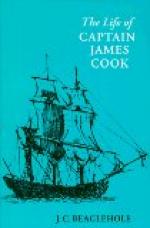During the early part of February they ran down east between 58 and 59 degrees South, frequently having to throw the ship up into the wind to shake the snow out of her sails, for the weather was very bad. After another unsuccessful attempt to find Cape Circumcision, the ship’s head was turned towards the Cape of Good Hope on 23rd February, and Cook had the satisfaction of feeling he had solved the problem of the non-existence of any southern continent except in close proximity to the Pole. He firmly believed from his observations of the icefields that such a continent in the far south did exist, but he asserted that further exploration in that direction would be of little service to navigation, and would be hardly worth the cost and danger that must be incurred.
On 16th March two Dutch ships were seen steering to the west, and a boat was sent off to the nearest, which proved to be the Bownkirke Polder, from Bengal. They were offered any supplies the Dutchman had, notwithstanding the latter was rather short, owing to his being some time out from port. Some English sailors on board told of the Adventure having been at the Cape of Good Hope some twelve months previously, and that she had reported the massacre of a boat’s crew in New Zealand. At the same time three more sail came up, one, an English ship, did not intend to call at the Cape, so Cook forwarded by her a letter to the Admiralty and received some provisions, and, most valuable gift, a packet of old newspapers. On the 22nd the Resolution anchored in Table Bay, saluting the Dutch flag with thirteen guns, and the next morning Cook waited on the Governor, who did everything he could to assist him and render his stay agreeable.
Three on the sick list.
Cook was greatly pleased to be able to report three men only on the sick list, and the remainder were granted as much leave as the refitting of the ship would permit. The rigging, of course, had suffered severely, and had to be replaced at an exorbitant cost from the Government Stores; but Cook calls attention to the state of the masts, which he considered, after sailing some 20,000 leagues, bore testimony to the care and ability of his officers and men, and also to the high qualities of his ship.
M. de Crozet put in on his way to Pondicherry, and was impressed with Cook’s courtesy and qualifications as an explorer. He was able to give the first information of M. de Surville’s voyage, and that he had cleared away a mistake Cook had made in assuming that the New Caledonia reefs extended to the Great Barrier Reef on the east of Australia. Forster says that Cook pointedly avoided having any intercourse with any of the Spaniards who were there, but gives no reason for it. He also bought a quantity of wild animals and birds, many of which died before reaching England, and he roundly but unjustly accused the crew of having killed them.




